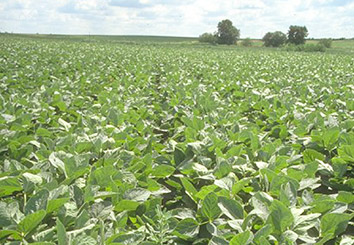Subscriber Benefit
As a subscriber you can listen to articles at work, in the car, or while you work out. Subscribe NowIt could take six months or more before Dow Chemical Co. and DuPont reveal how many jobs will be remain in Indianapolis following Friday morning’s announcement that the headquarters for their combined agriculture business would be located in Wilmington, Delaware.
The two companies designated Indianapolis as one of two “global business centers” for their combined $18 billion agricultural business but declined to say how the corporate reorganization would affect jobs here.
About 1,500 people work at the Indianapolis headquarters of Dow AgroSciences, Dow Chemical’s ag division, many of them highly paid executives and researchers.
Indiana state officials also said it was far too early to know how many people from the combined ag operations would work here.
“That’s due to the very, very, very early nature of this announcement,” Ted McKinney, director of the Indiana Department of Agriculture, told IBJ. “We just don’t know."
However, the Indiana Economic Development Corp. said in a written statement that “with the establishment of this global business center, long-term revenue and commensurate employment are expected to grow in Indianapolis.”
Kenda Resler Friend, a spokeswoman for Dow Agro, said that information likely won’t be disclosed until the two companies close the deal in the second half of this year.
“It’s going to be months, not weeks,” she said.
In the meantime, the two companies remain competitors, she said, and are not sharing information widely, outside of the highest levels.
“It’s business as usual,” she said. “We’re not giving each other a lot of hugs until this deal closes.”
Both companies said Wilmington will be home base for the CEO and “key corporate support functions." Delaware Gov. Jack Markell has vowed to work to reform Delaware's tax code, including lifting annual caps on research and development tax credits and offering payroll tax credits.
Delaware economic development officials also are offering the company up to $9.6 million in grants, mostly in matching funds for capital expenditures.
Indianapolis and the other global business center—in Johnston, Iowa—will be home to the leaders of business lines, R&D, the global supply chain, sales and marketing.
That was enough to make Indiana officials rejoice this morning.
“Indiana will have a major presence in the new company, and we’re thrilled, because no presence was one of the early options,” said McKinney.
He said Dow and DuPont were attracted to Indiana for Dow Agro's facilities and talent, Indianapolis International Airport, the “very strong presence” of Purdue University’s agricultural program, and the overall business climate.
Economic development officials in states across the country have been frenetically negotiating with Midland, Michigan-based Dow and Wilmington-based DuPont since the companies on Dec. 11 announced a historic merger of equals. Their merger is the first step in a plan to break apart into three publicly traded businesses, one of them focused on agricultural products, including herbicides and genetically modified seeds. That new, as-yet-unnamed business will be largest global player in crop protection and seeds.
Business observers had speculated it would be an uphill battle for Indianapolis to land the headquarters because DuPont’s ag business is significantly larger than Dow’s. The headquarters of DuPont’s Pioneer ag business is in the Des Moines, Iowa, suburb of Johnston.
Gov. Mike Pence called the announcement good news, saying in a statement that "Hoosiers can be assured our state will continue to play a leading role in the future of this exciting new company."
The IEDC said in a statement that “as a result of the state’s and city’s negotiations with the two companies’ leadership teams over the past several weeks, along with support from Indiana’s congressional delegation, a significant portion of the agriculture company will be based in Indiana.”
Dow AgroSciences CEO Tim Hassinger said Indianapolis' designation as a global business center ensures that the new company “maintains a strong focus on agricultural R&D innovation in Indiana and near our customers.”
DuPont’s ag business has about $11 billion in annual sales and employs 12,000 workers, while Dow Agro has $7 billion in sales and employs about 9,000.
Dow and DuPont officials said in December they planned to squeeze out $1.3 billion in cost savings from merging the ag units, but they have not estimated how many layoffs will occur.
“We will gain significant synergies through seed production cost efficiencies by maximizing the R&D programs of the two companies and through the optimization of our production and supply chains,” DuPont CEO Ed Breen, who will become CEO of the combined DowDuPont, said on the day the merger was announced.
Indianapolis Mayor Joe Hogsett said in a statement that he is “optimistic about the further growth of DowDuPont in our community. We look forward to ongoing conversations with their management team and will be aggressive in our efforts to attract even more jobs to Indianapolis.”
The Indiana Department of Agriculture's McKinney declined to reveal specifics on incentives offered by the state or city, saying negotiations are continuing.
“The city and the state have been very aggressive with incentives, and they will be performance-based,” he said.
The Iowa Economic Development Authority's due diligence committee Friday approved a $2 million forgivable loan and up to $14 million in research activities tax credits for the new company.
McKinney said controversy surrounding the Religious Freedom Restoration Act in Indiana did not enter into the negotiations and "never came up." Dow and DuPont are strong corporate advocates for gay rights.
The companies plan to complete their merger in the second half of this year. They expect to separate the ag business into a public company about two years later.
Please enable JavaScript to view this content.

